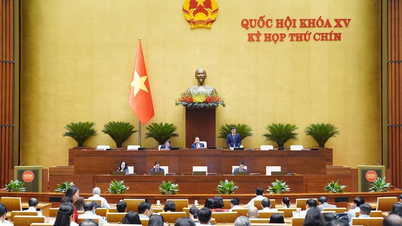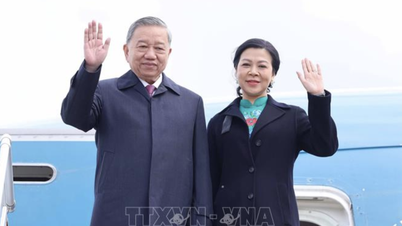(PLVN) - Through the FTA Index, local agencies and enterprises can review the implementation of the Government's action plan in conjunction with the action plans of the provinces and cities that built the FTA Index to identify what has been done and what needs to be further promoted, thereby finding more specific solutions and policies for businesses in their area to take advantage of the FTA.
 |
| The important task of the Multilateral Trade Policy Department is to complete the report on the results of developing the Index and submit it to the Prime Minister. |
(PLVN) - Through the FTA Index, local agencies and enterprises can review the implementation of the Government's action plan in conjunction with the action plans of the provinces and cities that built the FTA Index to identify what has been done and what needs to be further promoted, thereby finding more specific solutions and policies for businesses in their area to take advantage of the FTA.
New generation free trade agreements (FTAs) have opened up many opportunities for Vietnam to grow and diversify import-export markets, attract foreign investment, and bring positive impacts to the socio-economic development of the whole country. However, the implementation and utilization of FTAs are still uneven among localities. In order to provide practical solutions to apply in each locality, there needs to be measurement and evaluation from FTA enforcement management agencies.
Accordingly, based on the Government's directives from 2022, the Ministry of Industry and Trade has developed a Project on the Index to assess the implementation results of FTAs (FTA Index). Currently, the FTA Index is in the process of being completed with the goal of being ready for publication as soon as possible. In the immediate future, the top priority task is to complete the report on the results of the Index development and submit it to the Prime Minister for consideration.
According to Ms. Nguyen Thi Lan Phuong - Deputy Head of WTO and FTA Department, Multilateral Trade Policy Department, Ministry of Industry and Trade, we are implementing 16 FTAs, including 3 new generation FTAs such as CPTPP, UKVFTA, EVFTA... but only since the implementation of the CPTPP Agreement has there been an implementation plan. Thus, up to now, we have 4 FTAs with implementation plans, namely CPTPP, EVFTA, UKVFTA and RCEP. This shows a huge change in the central management agency when we implemented the previous FTAs when we signed them but did not have an action plan.
"Since the CPTPP Agreement, we have had plans and closely followed the Government's action plans. Along with that, ministries, branches and localities have also developed their own action plans, closely following the Government's requirements to effectively implement and make the most of these FTAs," said Ms. Nguyen Thi Lan Phuong.
 Ms. Nguyen Thi Lan Phuong - Deputy Head of WTO and FTA Department, Multilateral Trade Policy Department, Ministry of Industry and Trade. Ms. Nguyen Thi Lan Phuong - Deputy Head of WTO and FTA Department, Multilateral Trade Policy Department, Ministry of Industry and Trade. |
According to Ms. Phuong, although businesses, provinces and cities have achieved very positive results in the process of implementing and taking advantage of FTAs, there are still many limitations in the implementation process:
Firstly, the rate of preferential utilization is still very limited and businesses only focus on making raw products.
Second, in localities, although the attention and support for businesses to take advantage of FTAs has improved significantly, it is still very modest due to many different reasons, including reasons such as limited human resources and lack of professional training.
Third, we lack a detailed, transparent, specific and continuous mechanism to measure the results of FTA implementation, thereby providing solutions with continuous changes. That is, the implementation plan sets out a long-term plan, but each changing political and economic context requires central and local agencies to have more specific and practical solutions for industry associations and businesses to support them to effectively utilize FTAs.
During the development of the FTA Index, the drafting agency and the Editorial Board faced significant challenges, including time schedule and funding. Although the FTA Index is funded by the budget, the specialized agency did not decide to allocate funding for the task until May 2024. After that, the bidding process lasted 4 months, and by the end of September, the unit to conduct the investigation, data analysis, as well as synthesize and build the index was selected. In addition, many other complicated tasks and procedures were faced, creating pressure on time, expertise and finance.
However, overcoming all those barriers and challenges, the Ministry of Industry and Trade and relevant agencies have made continuous efforts to develop a report on the results of the FTA Index. Currently, this report is being submitted to the Prime Minister for consideration.
According to Ms. Phuong, the FTA Index was created to support many different subjects, from the National Assembly, central and local agencies, to investors, people and businesses. The FTA Index acts as a health index, measuring the capacity of provinces and cities and supporting businesses in the process of implementing Free Trade Agreements (FTAs). Thanks to that, support solutions for localities, businesses, industry associations and investors can be built more effectively and positively.
The representative of the Multilateral Trade Policy Department, Ministry of Industry and Trade emphasized that when the FTA Index is completed, it will become a tool to help the National Assembly evaluate, monitor the results and direct the implementation of the FTA better. For central agencies, the FTA Index will improve management and support localities and businesses in a more practical way.
Source: https://baophapluat.vn/fta-index-cong-cu-ho-tro-quoc-hoi-giam-sat-chi-dao-cong-tac-thuc-thi-fta-post534283.html


![[Photo] General Secretary To Lam meets and expresses gratitude to Vietnam's Belarusian friends](https://vphoto.vietnam.vn/thumb/1200x675/vietnam/resource/IMAGE/2025/5/11/c515ee2054c54a87aa8a7cb520f2fa6e)



![[Photo] General Secretary To Lam concludes visit to Russia, departs for Belarus](https://vphoto.vietnam.vn/thumb/1200x675/vietnam/resource/IMAGE/2025/5/11/0acf1081a95e4b1d9886c67fdafd95ed)
![[Photo] General Secretary To Lam arrives in Minsk, begins state visit to Belarus](https://vphoto.vietnam.vn/thumb/1200x675/vietnam/resource/IMAGE/2025/5/11/76602f587468437f8b5b7104495f444d)























![[Photo] National Assembly Chairman Tran Thanh Man attends the Party Congress of the Committee for Culture and Social Affairs](https://vphoto.vietnam.vn/thumb/1200x675/vietnam/resource/IMAGE/2025/5/11/f5ed02beb9404bca998a08b34ef255a6)
































































Comment (0)